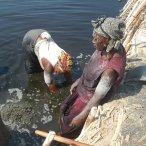English · Español

2 November 2015 | Interviews | Resisting neoliberalism | Human rights | Gender | Extractive industries | Climate Justice and Energy | Food Sovereignty
“Impacts of extraction on women in Africa”
New research: interview with Gender Officer of NAPE – Friends of the Earth Uganda, Shillar Osinde
Download: MP3 (17.6 Mb)
“Salt mining is labour-intensive and involves the use of rudimentary techniques of which women miners are particularly vulnerable and negatively impacted. Common health problems as a result of salt mining include inflammation of the uterus, dehydration, and chemical-induced burns and infection”, says a press release launched by the WoMin-African Gender and Extractives Alliance and the National Association of Professional Environmentalists (NAPE – Friends of the Earth Uganda).
“Due to the influx of transient traders from other parts of Uganda and beyond, the prevalence of HIV infection is also high and women, again, are most vulnerable due to poor access to healthcare and a work environment that can only exacerbate their already precarious circumstances”, adds the media advisory released on October 16th.
The WoMin-African Gender and Extractives Alliance (made of women’s organisations and movements) and NAPE launched today its Participatory Action Research (PAR) on women miners from Katwe Salt Lake, Western Uganda.
The PAR is part of seven community-based studies of women and mineral/oil-based development carried out by WoMin alliance members in Burkina Faso, Democratic Republic of Congo, Ghana, Nigeria, Uganda, South Africa and Zimbabwe (see the attached documents).
Real World Radio interviewed Gender Officer of NAPE, Shillar Osinde, to know more about this study.
WoMin and NAPE aim at recognizing the role of women in improving rural development and food security, despite the numerous injustices they suffer by the extractive models. “We particularly seek to highlight the challenges faced by women salt miners from Katwe Salt Lake in Kasese District”.
The press release also states: “Rural women make significant contributions to their local and national economies, and to regional and global trade, as smallholder farmers, entrepreneurs and labourers. They are responsible for producing and processing food, and feeding and caring for family members − particularly children and the elderly. They also generate income and contribute to the overall well-being of their households. However, in many countries, rural women continue to face discrimination in access to agricultural assets, education, health, employment and other services. Such obstacles prevent them from fully enjoying their fundamental rights and opportunities for growth. Women, as daughters or workers or both, have no title and are at the bottom of the production chain, notwithstanding the fact that they constitute the majority of harvesters”.
Acoording to the text, after participating in the Participatory Action Research (PAR) project, women miners of Katwe have deepened their understanding of the impacts of salt mining upon their lives and livelihoods and formed the Katwe Women Salt Miners Association, to demand accountability and lobby for appropriate action to improve their livelihoods.
Imagen: http://nape.or.ug/







